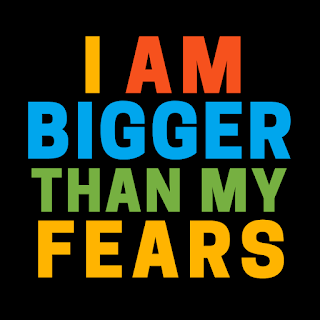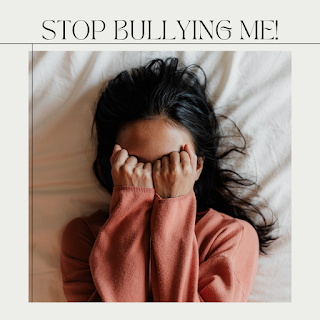5 Ways to Overcome Your Irrational Fears
What is Fear?
Fear is an emotional state that's evoked by threat of danger. And it's usually accompanied by physiological changes such as increased heart rate, as well as behavioural changes such as avoidance of fear-producing objects or situations. (https://www.oxfordreference.com/view/10.1093/oi/authority.20110803095812704)
A certain amount of fear is necessary for our own good. That's healthy fear, as I'd like to call it. However, when it becomes irrational, it's no longer healthy and it could do us harm instead.
What is Irrational Fear?
Irrational fear is fear that isn't situationally appropriate. In other words, it's out of proportion to the actual threat. And it can be a symptom of some mental health conditions, such as PTSD and panic disorder.
According to the author of Conquering Fear, an overdose of fear can keep us perpetually tense, emotionally closed and paralysed to the point of inaction. (Pg 24) Do we want any of these? Obviously no, right?
Therefore, it's important that we recognise signs of fear so that we can take appropriate actions to prevent it from gaining a foothold in our lives.
Signs of Fear
Signs of fear include the following:
1. Chest pain
2. Chills
3. Rapid hearbeat
4. Shortness of breath
5. Sweating
6. Trembling
7. Upset stomach
Why Fear?
There are many reasons why we are fearful. In order to overcome fear, we need to know why we're afraid in the first place.
The following are just some of the reasons why we're afraid:
1.Past Trauma
Past trauma, when left unresolved, can cause fear. And such fear is irrational in nature.
Someone extremely powerful has been constantly interfering with my job search (besides other areas of my life) and this has led to many wasted years. It's a deep trauma that I've yet to heal from.
Because the interviewers are only keen to gather information for the extremely powerful but evil man, this has led to my (irrational) fear of interviews. To be honest, I've yet to overcome this fear.
2. The Unknown
According to Healthline, fear of the unknown is the tendency to be afraid of something when we've no information about it at all.
For instance, in the case of Covid-19 pandemic, many people all over the world were afraid when it started making its rounds because it was an apparently unknown disease back then.
When I witnessed how people were suddenly so fearful of touching lift buttons and so fearful of others coughing/sneezing in public places back in 2020, I was actually quite surprised. I'm not judging those people, by the way. I was just surprised. And it wasn't just older folks who appeared to be scared.
For a long time, I'd always had poor health. But I wasn't scared of the pandemic. (I already had a relatively long list of fears - irrational fears - back then and so I really didn't need to add that to my list.) So when I witnessed young and seemingly healthy people appearing to be fearful of the pandemic, I was taken aback. That, to me, was a sign of irrational fear.
3. Failure
Nobody likes to fail, but failing at something at some point in time is possibly part and parcel of life.
When we're confronted with a situation where there's a possibility of failure, just thinking about it can cause us to become fearful. So some of us may prefer to stay in our comfort zone because of fear of failure. And some of us may prefer to stay in our comfort zone because of past failures.
How do we know if our fears have become phobic or irrational? Well, we know that our fears have crossed into the category of phobia when we avoid failure at all costs.
4. Loss
Any kind of loss can cause fear. And there are some losses that can cause greater fear than others.
For example, loss of employment can certainly cause a great amount of fear, especially if you don't have any form of savings.
Loss of health is another example. If you've always been healthy and all of a sudden you become seriously ill, it can certainly make you very fearful.
Loss of status is yet another example. If you've enjoyed a privileged status before, the loss could cause a great deal of fear.
Loss of control can certainly cause a certain amount of fear. I believe that as humans, we're wired to want to be in control - in control of our lives, at least - and so when we lose such control, it can be a very painful experience that's accompanied by fear.
Loss of relationships can be very painful, especially when it involves the passing of someone we love. And when we lose a loved one, it can cause us to be afraid. Afraid to be left alone. Afraid to get into another relationship, et cetera.
When does fear of loss become irrational? Well, to me, it becomes irrational when we're so fearful of losing something/someone we hold dear that we hold tightly to it/them and refuse to let go, even when it's no longer doing us any good.
5. Rejection
Nobody likes to be rejected. But it's inevitable that we'll face rejection in our lives at some point in time.
As humans, we want connection with others. So when we're rejected, it might make us question our self-worth. Are we not worthy to be accepted by people? Are we not worthy to be part of a group?
During my first year in university, I stayed in a hostel. And because I came from a poor family while many of the students who stayed in the hostel were from well-to-do families, I got despised and rejected.
If I remember correctly, there was a senior who openly mocked at me because I was once late in paying the hostel fee. I believed he did so because he was jealous of the fact that I'd an entire room to myself whereas he'd to share a room with someone else. Maybe he'd thought that a poor student like me shouldn't even be staying in a hostel? 😩
I felt hurt and humiliated. And I felt like an outcast and a misfit. So in the end, I moved out of the hostel after the first semester. And I became socially withdrawn throughout my university days. Although I still took part in group activities, I was basically withdrawn. I didn't feel any sense of belonging.
How do we know if our fear of rejection is irrational? According to the author of Bouncing Back from Rejection, when we overreact to small rejections as if they're major rejections, that's dysfunctional (irrational). (Pg 37)
How to Overcome Irrational Fears?
Fear doesn't go away on its own. In order to overcome fear, the first step is to identify the fears.
Why are you afraid? When did you start feeling afraid? Where were you when you first started feeling fearful? Has something traumatic happened to you before? These are some of the questions that may help you to identify your fears.
Your actions and thoughts may give you some clues about why you're afraid. For instance, if you avoid being alone in an enclosed space, it could be because something bad had happened to you in a similar space in the past.
Five Ways to Overcome Irrational Fears
1. Take Small Steps
It takes time to overcome fear. As such, you can't expect to go from being afraid to not being afraid of a particular situation in one day. Therefore, taking small steps could be more effective in helping you to overcome your fear.
I used to be afraid of cats and dogs. And I'd rather take longer routes or take more steps to get to where I wanted to go just to avoid them. It started off as a mild fear. But over time, it got worse and worse.
Between dogs
and cats, I was actually more afraid of the latter. And so whenever I
was at any public eating places, I'd be constantly looking out for stray (community) cats
except for places that I knew where there was none. As for stray (community) dogs, I didn't have as much fear because there were significantly fewer of them compared to cats.
In the early part of this year, a cat actually meowed at me instead of meowing at two other people I was with. I assumed it was trying to get my attention because it was hungry.
And when I first started feeding it, I didn't dare to go too near it. But when I tried to feed it a second time on another day, I actually went closer to it. At that point, I didn't dare to touch it. However, when I saw it again, I took the courage to touch it. Then finally, I allowed it to come so super close to me and walk across my feet.
2. Reframe Your Fear
Reframing your fear means looking at it differently. If you can reframe your fear as a desire, for example, you're approaching it from a positive mindset. You're basically shifting the focus from something you don't want to something you do want. (https://design.org/how-to-reframe-your-fears/)
Many years ago, I chose to go into long-term relief teaching because I wanted to have a better chance of getting a permanent teaching position. However, prior to making that decision, I was struggling internally because I craved for stability while at the same time I wanted to take the risk.
Why was I afraid back then? It was because doing long-term relief teaching didn't guarantee an offer of a permanent teaching position. But I really desired to go into teaching (reframing my fear as a desire) because I loved kids and I knew that I could impact their lives for good. And so I took the plunge.
I didn't end up getting a permanent teaching position but I gained something more valuable — confidence — as in confidence that I could handle any kind of challenging situations.
I must, however, say that my confidence had taken a serious beating over the past seven plus years and I need to work on regaining it. Incidentally, that could be a topic for another blog post.
3. Face Your Fear
It's natural to want to avoid anything that frightens you. However, running away doesn't help you overcome your fear. On the contrary, it may get you deeper into the fear trap. (https://www.healthyplace.com/blogs/traumaptsdblog/2013/10/5-ways-to-face-your-ptsd-fears)
But soon I realised that there was no way for me to avoid him forever, and so I started to programme my mind through self-talk and by intentionally going near him and touching him. And about a year later, when I saw a big dog, I was surprisingly not afraid at all. In fact, I didn't even avoid going near it.
I can now confidently say that I've overcome my fear of dogs.😊
4. Tap into the Power of Sound Healing
Sound is defined as vibrational energy and science has shown that all matter is in a constant state of vibration. (https://soundwellness.com/from-stress-to-health-managing-emotions/
Sound healing is defined as "the intentional use of sound to create vibrations which become a catalyst for healing in the physical, mental, emotional, or spiritual aspect of our beings."(https://sunreed.com/categories/what-is-sound-healing.html)
Fear can get trapped in our bodies. And when this happens, our energies get stuck. In other words, fear that gets trapped in our bodies results in energy blockages. But through sound healing, the vibrations from the sound can help to enhance energy flow, thereby eventually helping our energies to get unstuck.
A few years ago, I watched a talk show that talked about paranormal stuff. And in one of the episodes, a guest spoke about how a ghost hid underneath his bed. From then on, I was afraid of standing close to my bed. But somehow after some time, the fear was gone. (I can't recall how I overcame my fear back then.)
A few months ago, something triggered the fear and I was again fearful of standing close to my bed. However, after I started using sound healing, I noticed that I was no longer afraid. I'm not attributing it solely to sound healing but I believe that it's the key reason.
According to Good Therapy, therapy helps you to manage your fear by helping you to:
- Understand what is causing your fear
- Put your fear in perspective
- Set realistic expectations for the future
If you need professional help to overcome your fears, then you might want to consider going for one of the following therapies:
Exposure therapy is a form of behavioural therapy that's designed to help people manage their problematic fears. Exposure therapy works by exposing you to the thing you're afraid of little by little so that it doesn't overwhelm you.(https://www.regain.us/advice/general/7-tips-for-overcoming-irrational-fears/)
The idea behind this form of therapy is that exposing people to the stimuli that cause distress in a safe environment will help them reduce their avoidance tendency and overcome their fears.
2. Cognitive Behavioural Therapy (CBT)
CBT is a psycho-social intervention that focuses on changing unhelpful thoughts, beliefs, attitudes and behaviours, as well as improving emotional regulation and creating a suite of coping strategies to solve problematic issues. (https://positivepsychology.com/cbt-cognitive-behavioral-therapy-techniques-worksheets/)
CBT enables you to manage your fear by helping you to change the way you think gradually. And it's based on the interconnectedness of your thoughts, feelings and behaviours. (https://www.verywellmind.com/therapy-options-for-phobias-2672008)
CBT is often a preferred type of psychotherapy because it can help a person to quickly identify and cope with specific challenges. And it generally requires fewer sessions and is done in a structured way.(https://www.mayoclinic.org/tests-procedures/cognitive-behavioral-therapy/about/pac-20384610)
3. Eye Movement Desensitisation and Reprocessing (EMDR)
According to EMDR Institute, EMDR is a form of "psycholtherapy that enables people to heal from the symptoms and emotional distress that are the result of disturbing life experiences."
EMDR is a form of trauma-focused CBT that's specifically developed to reduce the power of traumatic memories. (https://www.brainline.org/treatment-hub/eye-movement-desensitization-reprocessing-emdr) During an EDMR therapy session, the psychologist would encourage the patient to recall the traumatic memory while following an object, which could be anything.
This combination of memory and eye movement allows the brain to reprocess the traumatic memory without triggering any stress response. (https://www.psychology.org/resources/emdr-therapy/)
4. Psychodynamic Therapy (PDT)
According to Psychology psychodynamic therapy (PDT) is a form of talk therapy that explores the connection between a person's past experiences and their current mindset.
And according to Draxe, PDT, also known as insight-oriented therapy, focuses on unconscious patterns as they're manifested in a person's present behaviour.
When we're dealing with fear, PDT can help us by making the unconscious patterns of fear conscious, so that we're no longer controlled by it. (https://www.psycom.net/depression/depression-treatment/psychodynamic-therapy)
5. Systematic Desensitisation
Systematic desensitisation, also known as graduated exposure therapy, is an evidence-based therapy approach that combines relaxation techniques with gradual exposure. During the therapy session, you'll work your way through different levels of fear, starting with the least fearful exposure. +https://www.healthline.com/health/systematic-desensitization#how-it-works)
According to Healthline, systematic desensitisation involves three main steps:
(1) First, you'll need to learn muscle relaxation techniques;
(2) Next, you'll create a list of your fears, ranking them in terms of intensity; and
(3) Finally, you'll begin to expose yourself to what you fear.
Conclusion
When you're dealing with an irrational fear, you may want to see it as your friend that's trying to help you heal something in your life so that you're no longer controlled by it.
According to the author of The Fear Cure, fear can be a messenger that alerts you to everything in your life that's in need of healing. And if you're willing to listen to your fear, it can help you to get on the fast track to healing your mind, soul and body. (Pg 33-34)
Cheers,
Annie Chan
(P/s: My next blog post will be published on 27 Nov 2022.)
NOTES
1. Check out my website:
https://www.elevatewellnesscircle.com/
2. Check out my affiliate programme:
https://www.elevatewellnesscircle.com/affiliate
3. Try for FREE: power recharge therapy, power foot detox therapy & acugraph energy analysis! (https://energia.sg/free?ref=anniechan)


















